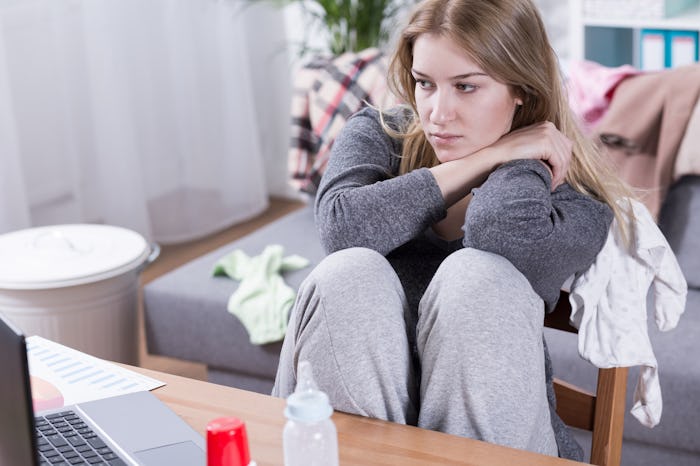Life

How Long After Giving Birth Can You Develop Postpartum Anxiety?
It makes sense that becoming a parent can bring some anxious feelings, but severe anxiety, also known as postpartum anxiety, can be brought on after delivery and can truly impact your life. It's more than just worrying about motherhood — it’s severe and can be just as devastating as postpartum depression, a condition most people have heard about. But how long after giving birth can you develop postpartum anxiety? And if you've never had anxiety before, how do you know what to look for?
Postpartum anxiety and postpartum depression are very similar, and if you have postpartum anxiety, you may also experience depression simultaneously. According to the American Pregnancy Association, if you notice changes in your eating and sleeping habits, have panic attacks, have an impending fear something bad is going to happen, or have dizziness, hot flashes, nausea, and racing thoughts, you may have postpartum anxiety.
Symptoms of postpartum anxiety typically begin the first few days after you’ve given birth, but the onset could be as late as six months after, says Dr. Mayra Mendez, a licensed psychotherapist and program coordinator for intellectual and developmental disabilities and mental health services at Saint John’s Child and Family Development Center in Santa Monica, California. However, if you haven’t experienced any symptoms within the first six to 12 months, you’re probably in the clear, Mendez tells Romper.
How can you treat postpartum anxiety? Mendez suggests many different ways, including stress management classes, multiple types of therapy, including psychotherapy, cognitive behavioral therapy, and mindfulness-based therapy, and medication evaluation. “The most effective anxiety treatments focus on teaching coping skills to manage fears and worry and promote shifting of negative thinking patterns,” Mendez says.
If you do have postpartum anxiety and it lasts for more than 12 months after giving birth, “They’re no longer temporary and may require more intensive treatment,” she adds.
If you think you are experiencing postpartum anxiety or depression, please know you’re not alone and it can get better. Postpartum anxiety affects 10 percent of all postpartum women, and postpartum depression affects 15 percent, according to the APA. Talk to your healthcare provider if you already have been diagnosed with, or think you may have tendencies of anxiety even before even getting pregnant — this will ensure your healthcare provider will have a plan for you to try to prevent you from experiencing postpartum anxiety.